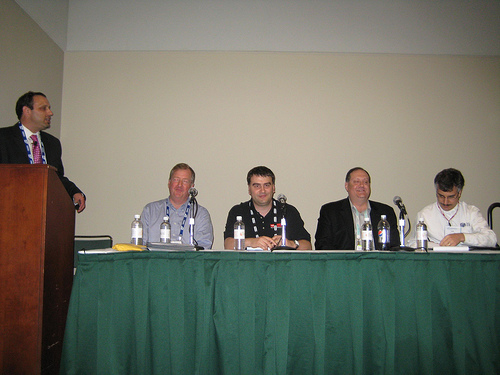Collaborate'09, and the BI Survey on Project Critical Success Factors
I'm currently sitting in the coffee area at my hotel, just back from the Orange County Conference Center after giving one of my presentations at Collaborate'09. Collaborate is a joint user group conference run by IOUG, OAUG and Quest, and this year Rittman Mead have been giving a number of sessions in the OAUG and IOUG tracks. Borkur and I arrived late on Saturday and made our way to the conference centre around lunchtime on Sunday.

The first session I took part in was the IOUG Business Intelligence Panel, along with Charlie, Dan Vlamis, a guy from IBM and myself. The question put to the panel was "what do you feel are the critical success factors for a business intelligence project", something I've been actually thinking about recently as I'd been looking through the recently released BI Survey 8, which we get a review copy of through helping bring in Oracle respondents.

- Query performance too slow : 18.1%
- Poor quality data : 16.4%
- Company politics : 13.8%
- Administrative problems (people related) : 13.7%
- Could not agree on requirements : 12.0%
Another interesting finding from the survey, and one that I felt that I had to point out in the panel session ;-), was that customers reported far higher project success rates when the project was led by either the business users, or by specialist, independent consultants, compared to implementations by the vendors' own consultants. Now whether there is a direct cause-and-effect relationship between these, or whether in general more informed and more committed customers have more project success, and also they are more likely to seek out specialist consultancies is hard to say, but when you look at the particular project issues around Oracle business intelligence projects, I can take a guess.

Moving on to the Oracle Classic (BI Standard Edition) product line, just under twice as many (32.4% compared to 18%) customers reported problems with query performance, and 13.5% compared to an average of 3% reported problems with security limitations in the product. Again, you've got to know what you are doing to be able to anticipate these problems and come up with solutions that don't add months to the project timeline, something the general systems implementors are unlikely to know in enough detail. Looking at the Hyperion customer scores, a far greater proportion (20% compared to 10%) had issues with product reliability and bugs, and when this sort of thing happens but you've already made the committment to buy and implement the product, you need a consulting partner who's been there and knows how to work around it. It's important to understand that all the products had one area or another that they were weak in; for Business Objects, again it was unreliable software, for SAP Business Warehouse, query performance was a huge issue, more than for any other platform. But the point still stands that dedicated, specialist consultancies that aren't tied to the company "party line" and spend all their time understanding the products are more likely to lead to project success, a point I made at the panel session.
